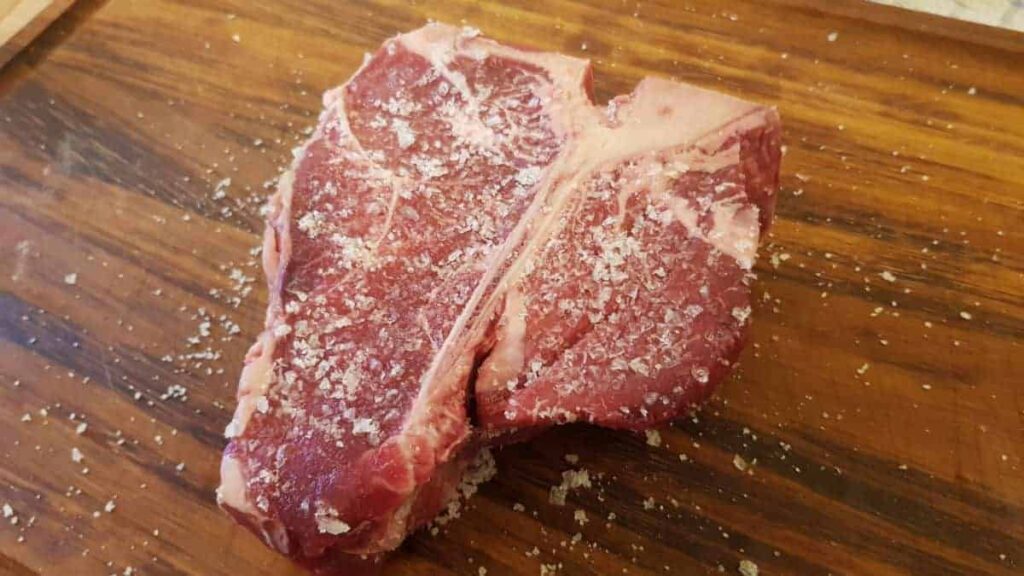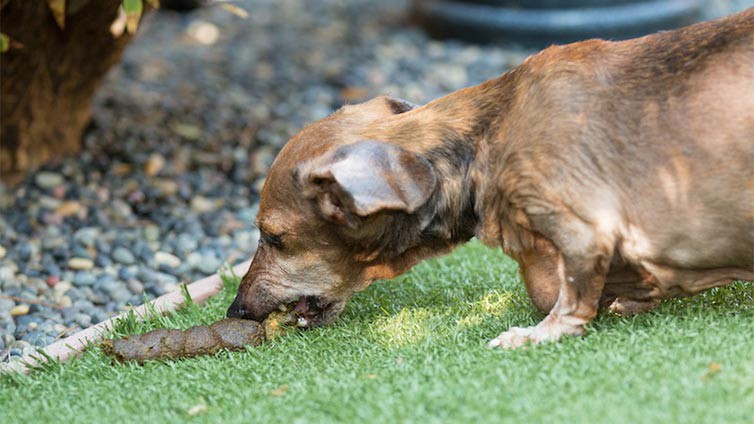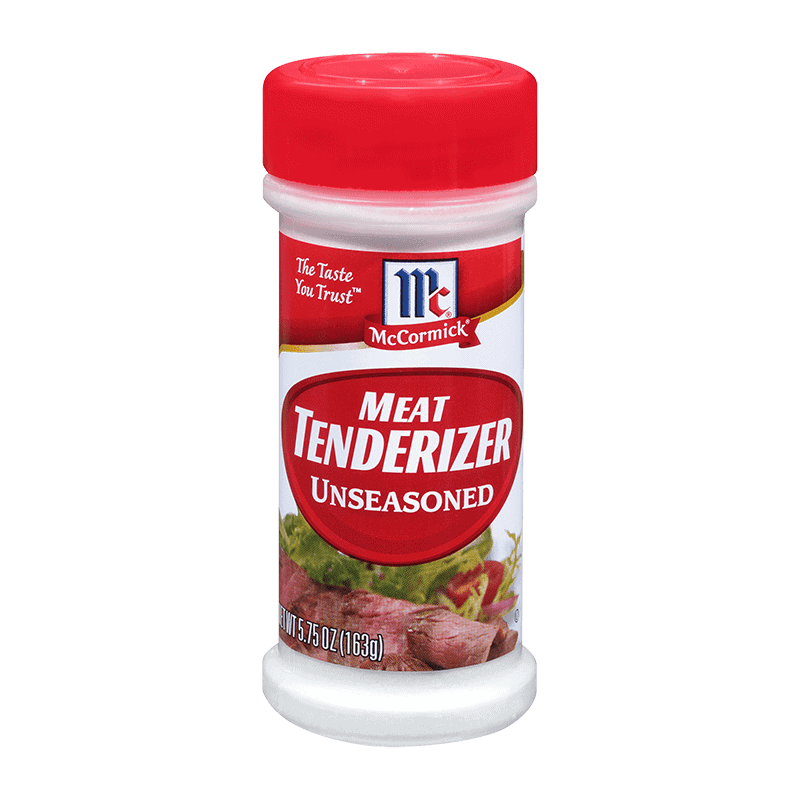Dogs sometimes pull the craziest, most jaw-dropping stunts that make us gape in awe.
Take for instance an adorable pup that chomps on her own feces? With all the quality expensive food you give her, what could probably prompt her to munch on poop?
There are a couple of reasons for the behavior including boredom and anxiety, poop tastes good, nutritional deficiencies, and imitating other dogs among others.
A dog that eats poop is not only unpleasant to hang with but she puts herself at the risk of contracting diseases.
Poop carries the worst microorganisms, including E. coli and Salmonella. These microorganisms should never find their way to your dog’s tummy or yours for that matter.
One of the ways to stop your dog from munching her waste is by adding meat tenderizer to her food.
But is it safe? Does it even work? And how much tenderizer should you add to dog food?
In this post, we offer the answers to the questions above and more.
What Is The Fuss With Meat Tenderizer in Dog Food?

Well, meat tenderizer is a product used to tenderize meat. It contains proteolytic enzymes such as bromelain that digest protein.
Bromelain is produced by certain fruits like pineapple stems. When added to dog food, it increases protein digestion thus altering the taste of the waste.
The enzyme literally derives almost all of the protein from the poop so your dog will be discouraged from consuming it.
For a dog that suffers from coprophagia or eating stools, meat tenderizer makes poop less appealing hence discouraging the disgusting behavior.
Can I Feed My Dog Meat Tenderizer? Is It Safe For Dogs?

Like many dog products, meat tenderizers come in many varieties. Some are derived from natural sources including fruits (figs, pineapple, pawpaw, and kiwi), ginger, beer, wine, black tea, vinegar, baking soda, cola, and coffee.
When used in small amounts, these products are totally safe for your dog.
Commercial meat tenderizers are also safe for your pup as long as they are not seasoned or formulated with many flavorings.
Seasoned tenderizers may have ingredients that may be harmful to your dog. For example, some of the products contain onions and garlic which are a no-no in the canine world.
Safe meat tenderizers include things like sodium (in small concentrations), bromelain, papain (this works like the bromelain to break down proteins), and MSG (safe preservative).
Anything with salt, color, flavorings, and other chemical additives is unsafe for your dog.
How Do You Add Meat Tenderizer to Your Dog’s Food?
If you’ve used a meat tenderizer to soften your meats, you know that you apply it when the meat is raw.
Most meat tenderizers come in powdered form. To add them to your dog’s food, simply moisten the surface of the meats.
Next, sprinkle a dash of the tenderizer and pierce the surface a few times with a fork to get the tenderizer to penetrate the meat.
Wait for a few minutes then start the cooking process.
Is There MSG In Meat Tenderizer?
Monosodium glutamate (MSG) is a common food additive used to enhance the flavor of food. It is a derivative of glutamic acid or glutamate which is an abundant amino acid.
Some meat tenderizers use MSG to further alter the taste of the dog’s poop.
It works with the enzymes in the tenderizers to make poop less savory.
When looking for a good meat tenderizer, be sure to get one with MSG. It is completely safe for your pet according to the FDA.
Is Adolph’s Meat Tenderizer Safe For Dogs?
Adolph meat tenderizer is an unseasoned all-natural tenderizer.
It utilizes natural sugars, sea salt, and pineapple fruit extract as its ingredients. Perhaps the number one reason why it is a favorite in many homes is because it doesn’t contain MSG.
While many people believe MSG is safe for human and pet consumption, others have a contrary opinion.
Whichever category you fall into, there’s no doubt Adolph’s meat tenderizer is safe for dogs. It is gentle, natural, and uses dog-safe ingredients.
The tenderizer is seasoned though, so you might want to keep the portions low to avoid adding too much salt to your dog’s food.
What About Accent Meat Tenderizer on Dog Food: Is It Safe?
Accent meat tenderizer is another popular flavoring spice out there.
Its main ingredient is MSG, which is claimed to be natural. There’s no other harmful ingredient used in the recipe.
The reason it has a bad rap is because the media dragged the brand back in the day claiming MSG is toxic.
However, since the FDA cleared the air of the consumption of MSG, Accent tenderizer is safe to use.
Will Meat Tenderizer Stop My Dog From Eating Poop?

The whole idea of adding meat tenderizer to your doggie’s food is to stop coprophagia. It helps deter your beloved pet from consuming waste.
Unfortunately, it doesn’t work for all dogs. Some keep eating the disgusting stuff even after the taste is altered by the enzyme and MSG in the tenderizer.
In such a case, you might want to try other tenderizers like pineapple, kiwi, ginger, and vinegar.
If nothing works, there are products that are added directly to the poop to make it extremely bitter. You might want to try those.
However, the best method would be to remove poop from your compound to remove the temptation once and for all.
How Much Meat Tenderizer to Use on Dog Food?
No matter the size and breed of your dog, a generous sprinkle of meat tenderizer on her food will do the trick. You don’t want to go overboard as that may cause stomach upsets.
As mentioned earlier, you want to go for a tenderizer with MSG in it. This way, you capitalize on both the MSG and tenderizer benefits to deter your doggie from eating poop.
Closing Thoughts
A dog that eats poop is no fun to be around. When they lick your face or want to cuddle with you, the smell will gross you out.
If you have a meat tenderizer in your pantry, add some of it to the dog’s food to change the flavor of the feces.
Hopefully, that will get your doggie to stop eating her poop once and for all.
Interested in learning more about managing your pup’s elimination issues? Here are posts that you may find useful:
How Often Should a Chihuahua Poop?
Why Do Dogs Eat Poop in the Winter?
How to Make a Dog Poop with a Match (Does It Work And Is it safe?)
As an Amazon Associate, we may receive a small commission from qualifying purchases but at no extra cost to you. Learn more. Amazon and the Amazon logo are trademarks of Amazon.com, Inc, or its affiliates.


